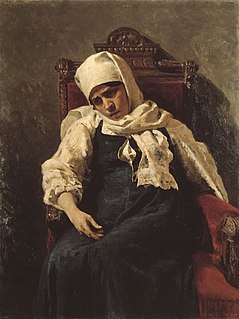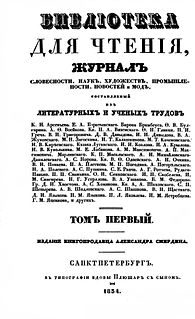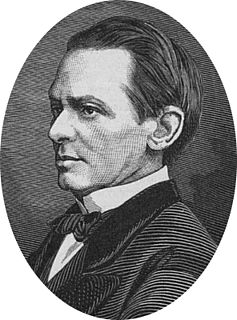
Alexander Nikolayevich Ostrovsky was a Russian playwright, generally considered the greatest representative of the Russian realistic period. The author of 47 original plays, Ostrovsky "almost single-handedly created a Russian national repertoire." His dramas are among the most widely read and frequently performed stage pieces in Russia.

Aleksey Feofilaktovich Pisemsky was a Russian novelist and dramatist who was regarded as an equal of Ivan Turgenev and Fyodor Dostoyevsky in the late 1850s, but whose reputation suffered a spectacular decline after his fall-out with Sovremennik magazine in the early 1860s. A realistic playwright, along with Aleksandr Ostrovsky he was responsible for the first dramatization of ordinary people in the history of Russian theatre. "Pisemsky's great narrative gift and exceptionally strong grip on reality make him one of the best Russian novelists," according to D.S. Mirsky.

The Alexandrinsky Theatre or Russian State Pushkin Academy Drama Theater is a theatre in Saint Petersburg, Russia.

A Bitter Fate, also translated as A Bitter Lot, is an 1859 realistic play by Aleksey Pisemsky.

Valery Vladimirovich Fokin is a Russian theatrical director and writer. He is the Artistic Director of the Alexandrinsky Theatre in St. Petersburg, and the President of The Meyerhold Centre in Moscow. Fokin is decorated with four honorary Russian state awards.

Aleksey Mikhailovich Zhemchuzhnikov was a Russian poet, dramatist, essayist and literary critic, co-creator of Kozma Prutkov, the famous comical literary character.
The Simpleton is the debut novel by Alexei Pisemsky, written in the late 1840 and first published in October and November 1850 by Moskvityanin. The novel has met critical acclaim and made Pisemsky a popular author.
Boyarshchina is an early novel by Aleksey Pisemsky. Written in 1844-1846 under the original title Is She to Blame?, it was published only in 1858 in Biblioteka Dlya Chteniya magazine.

Biblioteka Dlya Chteniya was a Russian monthly magazine founded in Saint Petersburg, Russian Empire, in 1834 by Alexander Smirdin.
The Poor Bride is a play by Alexander Ostrovsky, written in 1851 and first published in the No.4, 1852 issue of Moskvityanin magazine. It was his first play to be staged at the Maly Theatre, where it premiered on 20 August 1853.
It's a Family Affair-We'll Settle It Ourselves is a comedy by Alexander Ostrovsky. It was his first major work, written in 1849 and published in the No.6 1850 Moskvityanin issue. Having caused a furore, it was banned by the Imperial Theatres' censorship committee and was staged for the first time on 9 December 1860, ten years after its publication. For some time the play has been also referred to as The Bankrupt, which was its original title.
Stay in Your Own Sled is a play by Alexander Ostrovsky, written in 1852 and first published in the No.5, 1853, issue of Moskvityanin. It was premiered in the Maly Theatre on January 14, 1853.
A Profitable Position is a play by Alexander Ostrovsky. It was first published in No.1, January 1857 issue of Russkaya Beseda and came out as a separate edition later that year. Banned from being produced at the Russian Imperial theatres, it was premiered only six years later, on September 27, 1863, in Saint Petersburg's Alexandrinsky Theatre as a benefice for actress Elizaveta Levkeyeva. On October 14 of the same year it was performed in Maly Theatre, as actress Ekaterina Vasilieva's benefice.
A Protégée of the Mistress is a play by Alexander Ostrovsky, first published in the No.1, January 1859 issue of Biblioteka Dlya Chteniya. Refused the permission to be produced at the Imperial Theatres in October 1859, it premiered in Maly Theatre, Moscow, only on October 21, 1863.
An Ardent Heart is a play by Alexander Ostrovsky written in 1858 and first published in the January 1869 issue of Otechestvennye Zapiski. It was premiered on 15 January 1869, at the Moscow's Maly Theatre and then on 29 January at the Saint Petersburg's Alexandrinsky Theatre.
It's Not All Shrovetide for the Cat is a play by Alexander Ostrovsky written in 1871 and first published in the No. 9, September 1871 issue of Otechestvennye Zapiski. It was premiered on October 7, 1871, in Moscow's Maly Theatre.

The Forest is a play by Alexander Ostrovsky written in 1870 and first published in the January 1871 issue of Otechestvennye Zapiski magazine. It was premiered at Saint Petersburg's Alexandrinsky Theatre on 1 November 1871, as a benefit for actor Fyodor Burdin. In Moscow's Maly Theatre it was performed on November 26, 1871.
Three Deaths is a lyric drama by Apollon Maykov. Its original version, called "The Choice of Death", finished in 1851, had problems with censorship and was first published, severely cut, under the title Three Deaths in 1857, in the October (No.10) issue of Biblioteka Dlya Chtenyia. The final version of it appeared in the Complete A.N. Maykov (1893).

Alexander Filippovich Smirdin was a prominent Russian publisher and editor. Smirdin was the first in Russia to start selling books cheap enough to make them accessible to wide readership, and to develop the standard set of financial criteria for paying authors. He maintained strong links with the country's literary elite and, in retrospect, played a key role in the development of Russian literature in the early 19th century. Smirdin published all the best known works by Nikolai Karamzin, Vasily Zhukovsky, Alexander Pushkin, Ivan Krylov as well as numerous textbooks and seminal books on history and science.

Pyotr Ivanovich Zubrov was a Russian stage actor, associated with the Alexandrinsky Theatre.















